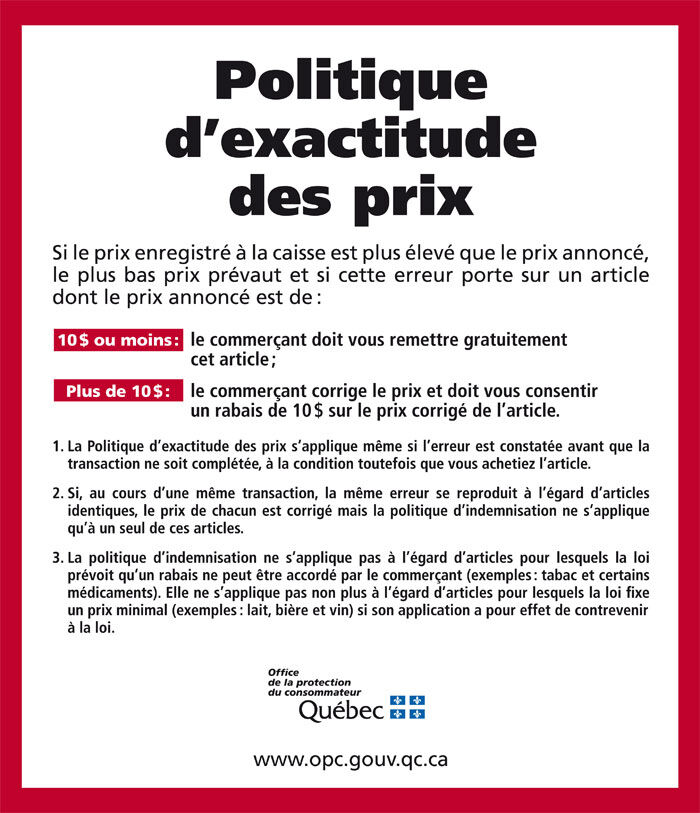Knowing your rights and responsibilities as a consumer will help you in many situations. Whether in relation to a contract, a pricing error or to show proof of purchase, you need to know what to do and what not to do. There are several organizations that can help you in this regard.
Most of the time, merchants must put the price on each of their products. In some cases, the price will be on the shelf or display. The way the price is displayed is important, because the rules to be applied will be different if an error occurs.
Say you are shopping for a new pair of running shoes, but there’s a mistake in the price when you get to the checkout. The price on the box of shoes is $89.99. The price given at the register, before taxes, is $119.99. The clerk insists that the price is $119.99. Is he right?
Since there is a price tag directly on the product packaging, the store must sell you the shoes at the lowest price listed. In this case, the lowest price is the price on the box. By law, you should pay $89.99 plus tax.
The rules are different if the price is not listed on the product, but rather on the shelf. The Price Accuracy Code applies.
Have you seen this sign at the checkout counter of the grocery store or drugstore? All stores with unlabelled products must display the Price Accuracy Code.

Source: Office de la protection du consommateur
To summarize this policy: if there is an error between the price of the product listed on the shelf and the price displayed at the store checkout, there are two possibilities:
- If the item costs less than $10, the store must give it to you for free.
For example, the price of the three notebooks you want to buy is higher at the cash register than on the shelf. The shelf says that a notebook costs $3.99. Once you point out the error, a clerk must check the price on the shelf and confirm the error. The clerk must then give you one notebook for free and correct the price of the other notebooks to $3.99.
-
If the item costs more than $10, the store must give you a $10 discount on the corrected price of the item.
Let’s go back to the example of running shoes. This time the price of the shoes is not on the box, but instead on the display shelf.
The posted price is $89.99. When you get to the cash register, the clerk tells you that the cost is $119.99. The clerk or the person in charge must correct the price to the one displayed on the shelf ($89.99) and deduct $10. You will pay $79.99 (plus tax) for your shoes.
If the price at the cash register is lower than the price on the shelf, the amount you will have to pay is the price at the cash register. No other calculations are required because the error is to your advantage.
Did you know that when you buy goods in Quebec, they are automatically covered by a legal guarantee?
The legal guarantee ensures a product is of good quality, without manufacturing or hidden defects, and has a reasonable lifespan with normal use. The lifespan varies according to the type of product and the amount paid for it.
A new refrigerator you buy in a store when you first move into an apartment is covered by the legal guarantee. You have the right to demand that this guarantee be respected in case it stops working in the next few years.
Note that some manufacturers also offer a warranty. Its cost is included in the sale price of the goods. The price is often indicated on the product’s box or the merchant will tell you about it. Do not hesitate to ask whether there is a manufacturer’s warranty and, if so, if you can have a written description of it.
Some merchants offer additional guarantees on the goods they sell. These are not included in the price, meaning you have to pay an extra amount of money for coverage. It is up to you to decide if these warranties provide an additional benefit to the legal guarantee.
For more details on guarantees, consult the concept sheet on Laws.
The Éducaloi and Office de la protection du consommateur (OPC) websites are also useful resources.
When an agreement is made verbally or in writing, what was agreed to must be respected. You are entitled to demand that all the clauses (points outlining the details of the contract) are applied and respected.
For example, you have just signed up for a television package, but when you look for your favourite channel, it is not available. You look at your contract and that channel is on the list of the included channels. You contact your service provider and a clerk tells you that this channel is no longer part of the package you signed up for. Since it is included in your contract, you have the right to demand that the provider respect it and give you access to the channel.
For more information about contracts, consult the concept sheet on Laws.
Before you sign a contract or buy goods or services, do your research, read the available materials and ask questions. Being well informed is often quite simple. Take the time to inquire about the Refund and Exchange Policy when you purchase goods, since this changes from merchant to merchant.
Your research will come in handy for larger purchases such as a refrigerator or a cellphone plan. Being well-informed will help you make better choices and prevent unpleasant surprises later on. You will also know what recourse is available to you and what to do if something goes wrong.
A recourse is a procedure to gain recognition of a right that has not been respected.
Contracts can be made for any number of situations: employment contracts, sales contracts, rental agreements.
When you buy goods or services, you agree to abide by the sales contract. This can include making payments in the amount and at the times specified, among other things. When you sign a contract for cellphone service, you agree to pay the full amount for your plan each month.
Did you know that a contract does not have to be written and signed? A clear verbal agreement between two people is also a valid contract under the law.
This means that the agreement is valid if you agree to mow your neighbour’s lawn, even if it’s not in writing. By talking to each other, you have agreed to a service (mowing the lawn with the neighbour’s lawn mower) for a fee ($12 for each mowing), making it a contract that you will both respect all summer.
Personal information makes it possible to identify you. This can include:
- your social insurance number or SIN
- your driver’s licence number
- your personal identification number or PIN (at the credit union, bank, school or certain businesses)
- your telephone number
- your home address
- your email address
- your banking information
A social insurance number is a nine-digit identification number assigned to a person by the Canadian government. This number grants access to various government programs.
You must protect your personal information to avoid problems like identity theft.
Tips to Protect Your Personal Information
Be careful |
 |
|---|---|
|
Only share your information when necessary and only with people, companies or government officials who need to know. Once you are officially hired, your new employer will need a significant amount of personal information for record-keeping purposes. Among other things, you will be asked for your home address and social insurance number. Give this information in a safe manner and only to the appropriate person in the company. |
|
Be alert |
 |
|
Identify and delete emails that seem suspicious. Be wary of suspicious phone calls. Some emails may seem safe although individuals may in fact be trying to illegally obtain your information. Never respond, click on a link or open an attachment without checking the entire email first. Do you recognize the address and the person sending the message? Does the email ask you to act quickly and provide your personal information? Some people can try to illegally obtain your personal information by contacting you by phone. As with emails, you must remain alert. A government agency or organization will never contact anyone to ask for personal information or threaten serious and legal consequences if you fail to respond quickly. If in doubt, look it up on the Internet. Many fraud attempts are reported on the Internet. It is a good idea to report suspicious emails and calls you receive, especially to the Canada Anti-Fraud Centre. |
|
Shred before you throw away |
 |
|
Tear up or shred documents that contain personal information (bank statements, bills, etc.) before you throw them away. Anyone might have access to your trash or recycling bin and take your documents, then all they have to do is use the information. |
|
See the Financial Consumer Agency of Canada website for more information. The Office of the Privacy Commissioner of Canada, shares tips on how to protect your privacy on its website and the Canadian Anti-Fraud Centre has put together several examples of real-life fraud.
Hooray! You just got a brand new smartwatch. Keep the store receipt, the documentation that came with the watch and the warranty document. What are the options for exchanges or refunds? What are the warranties? How do you program it? With the sales receipt and documentation, you will have everything you need if there is a problem with your watch.

Here’s a useful tip: Take a picture or photocopy your receipts because some will fade over time.
In Quebec, the Office de la protection du consommateur is responsible for the application of several laws, including the Consumer Protection Act and the Travel Agents Act.
You can refer to the OPC to find information about credit card and cellphone contracts, for example. It is a trusted source for information on what you can do if you have a problem with a merchant and it gives you tools for taking action. You can also file a complaint with the OPC if you see or experience a suspicious situation with a merchant.
Visit the Office de la protection du consommateur website.
You can contact the Tribunal administratif du logement, previously known as the Régie du logement or rental board, if you have questions or concerns about any situation related to renting a dwelling. This organization is responsible for providing information and enforcing the law. The Tribunal administratif du logement can answer your questions about leases, rent increases or emergency repairs in a building with rental units.
Visit the Tribunal administratif du logement website.
Éducaloi is a website that simplifies legal information. The subjects covered range from legal guarantees to the laws governing contracts, online purchases and credit cards.
Visit the Éducaloi website.
Many associations exist to defend consumers. Some specialize in one field while others cover a wide range of subjects, from travel to telecommunication contracts to legal guarantees.
Here are some of them:
Associations de consommateurs du Québec
-
An overview of several topics that affect consumers
-
Tools for personal finance
Option consommateurs and L’Union des consommateurs
-
Mission: to promote and defend consumer rights
-
Articles and practical guides for personal finance and consumer products
Automobile Protection Association (APA)
-
Information on buying, leasing or maintaining a vehicle
-
Independent vehicle evaluations and sharing of results
Collectif, Mes dossiers, p.28
Collectif, Profil. Enjeu Consommer des biens et des services, p.20-28
Collectif, Finances en jeu. Enjeu Consommer des biens et des services, p.84-89